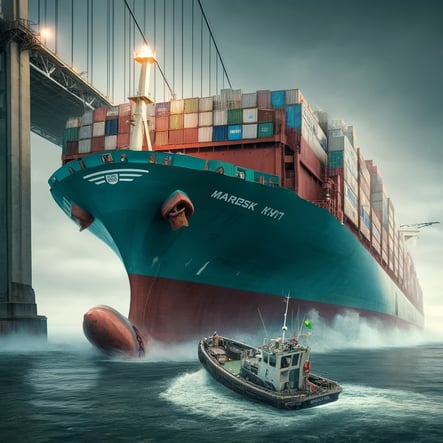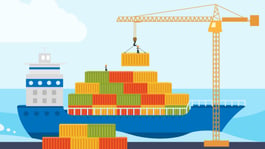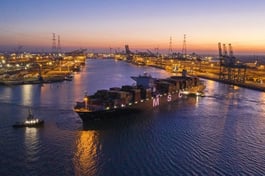
Remember: This is a simplified explanation. Consulting a maritime lawyer for specific legal advice in a complex scenario like this is highly recommended.
Image this dramatic scene at the Port of Baltimore: a Maersk container ship loses power, potentially due to faulty equipment or contaminated fuel, and slams into the Francis Scott Key Bridge! Thankfully, the pilot acts quickly, dropping anchor and attempting to steer away from a catastrophic collision.
Here, "General Average" (GA) might come into play (Maersk's web page discussing General Average). It's a centuries-old maritime law principle that ensures everyone shares the burden when extraordinary sacrifices are made to save the ship and cargo.
How GA Works in this Scenario:
The power failure itself isn't a sacrifice triggering GA. However, the pilot's actions could play a role:
-
No Sacrifice: If the anchor held and the ship avoided major damage, GA wouldn't apply. The bridge damage and any minor ship repairs wouldn't be shared costs.
-
Sacrifice Triggered: If the anchor failed, causing further damage to the ship or requiring jettisoning cargo to prevent sinking, then GA would be triggered. All cargo owners (including Maersk for the ship) would then share the costs associated with:
Insurance and GA:
Most cargo insurance policies cover GA contributions, providing a financial safety net for businesses. However, it's vital to check your policy for any exclusions or limitations.
INCOTERMS and GA Liability:
INCOTERMS 2020, international trade rules (INCOTERMS 2020) determine who's initially responsible for GA depending on the agreed delivery point (i.e. - Place of Delivery) between buyer and seller. Here's a breakdown for common INCOTERMS:
-
EXW, FCA (Seller's Responsibility): Under these INCOTERMS, the seller is responsible for GA until the goods are loaded onto the vessel at the port of origin. After that, the buyer bears the risk.
-
CFR, CIF, CPT, CIP (Buyer's Responsibility): With these INCOTERMS, the risk of GA falls on the buyer once the goods are loaded onto the ship.
Cash Collateral and GA:
Before releasing cargo, the average adjuster (a neutral third-party) might demand cash collateral from cargo owners as a security deposit for their share of GA contributions. INCOTERMS don't dictate who pays the collateral, but it's often negotiated between buyer and seller.
Nuances for Different Cargo Types:
-
General Cargo: Standard dry goods like clothing might have some time to wait for GA resolution before value is affected.
-
Refrigerated Cargo: Perishables like fruits are time-sensitive. Delays due to GA disputes could lead to spoilage, adding another layer of complexity. The cargo owner might have additional claims beyond GA for the spoiled goods.
-
Non-Durable Cargo: Fragile items like electronics might be damaged during salvage operations, creating additional claims beyond GA for the damaged goods.
Key Takeaways:
-
GA applies when extraordinary sacrifices are made to save the ship and cargo in an emergency. The pilot's actions here determine if GA applies.
-
Cargo insurance typically covers GA contributions, but check policy details.
-
INCOTERMS determine who's initially responsible for GA based on the delivery point.
-
Cash collateral might be required before cargo release.
-
Different cargo types have unique considerations in GA situations.
Remember: This is a simplified explanation. Consulting a maritime lawyer for specific legal advice in a complex scenario like this is highly recommended.




Leave a Comment